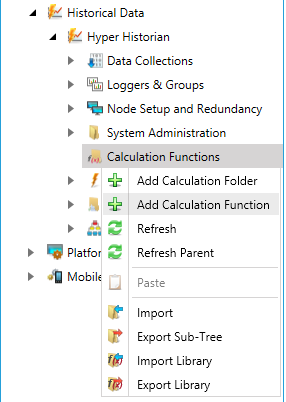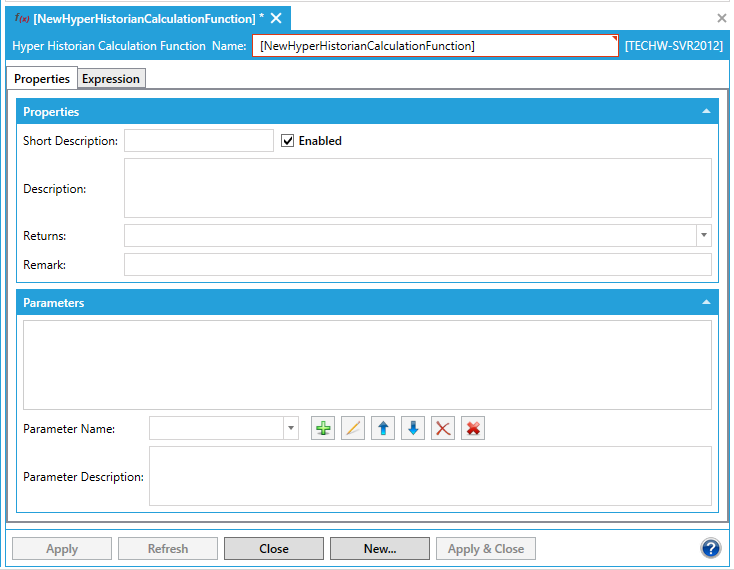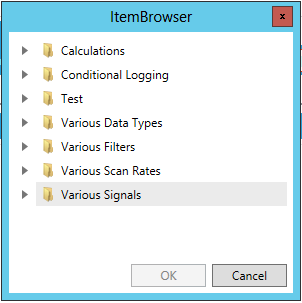Add Calculation Function
To Create a Calculation Function:
-
Start the Workbench, then expand your project. Next, expand the Historical Data node to show the Hyper Historian node. Expand the Hyper Historian node to show the Calculation Functions node.
-
Right-click the Calculation Functions node in the navigation tree, or any of its sub-nodes, and select Add Calculation Function, as shown in the figure below.
Add Calculation Function from the Project Explorer

-OR-
Select the Calculation Functions node in the Project Explorer, or any of its sub-nodes, then click on the Add Calculation Function button, shown below, in the Edit section of the Home ribbon in the Workbench.
Add Calculation Function Button

-
This opens the Calculation Function properties window, shown below, beneath the Project Details section in the Workbench. Enter a name in the Hyper Historian Calculation Function Name text entry field.
Hyper Historian Calculation Function Properties

-
Complete the Properties tab settings.
Properties Tab
Properties
- Short Description - Enter a short description of the function.
- Enabled - Click this checkbox to specify that the calculation is enabled for the tag.
- Description - Enter a description of the function.
- Returns - Use the pulldown menu to select the return of the function, including:
-
- Internal data variable, i.e. {{fully_qualified_variable_name}}
- DateTime value indicating begin of the time interval to process data for
- DateTime, TimeSpan or Numeric milliseconds value indicating end of the time interval to process data for
- DateTime value to perform operation on
- Numeric value in range 0-100 indicating percentage of good samples in given time interval to return good status code for processed value
- String value representing comparison type, it can be one of the following "==", "!=", ">", ">=", "<", "<="
- Numeric value to compare with
- A boolean value representing the state to search for
- Remark - Enter a remark of the function.
Parameters
This section defines the order of parameters. The first listed parameter is the first parameter of the function.
- Parameter Name - Click this pulldown menu to select from variable, startTime, endTime, sourceTime, percentGood, comparisonType, comparisonValue, boolState, bool, dataValue, dateTime, string, uint, double, int, arrayPosition, array, arrayElement, pathFilter, nameFilter, or typeFilter.
-
 - Adds the selected Parameter selected from the Parameter Name pulldown to the list in the field above.
- Adds the selected Parameter selected from the Parameter Name pulldown to the list in the field above. -
 - Edits a selected Parameter within the list.
- Edits a selected Parameter within the list. -
 - Moves a selected Parameter toward the top of the list.
- Moves a selected Parameter toward the top of the list. -
 - Moves a selected Parameter toward the top of the list.
- Moves a selected Parameter toward the top of the list. -
 - Removes a selected Parameter from the list.
- Removes a selected Parameter from the list. -
 - Deletes a selected Parameter from the list.
- Deletes a selected Parameter from the list.
- Parameter Description - This section is auto-filled based on the selection within the Parameter Name menu.
-
Complete the Expression tab settings.
Expression Tab
In the Expression Tab, you can add your selected expressions by clicking on the Arithmetic, Relational, Logical, Bitwise, Functions or Variables... button.
Arithmetic
+ - Addition
- - Subtraction
* - Multiplication
/ - Division
% - Modulus
( - Open Parenthesis
) - Close Parenthesis
sin(angleInRadians) - Sine
cos(angleInRadians) - Cosine
tan(angleInRadians) - Tangent
asin(number) - Arcsine
acos(number) - Arccosine
atan(number) - Arctangent
sqrt(number) - Square Root
pow(base, exponent) - Raise to Power
log(number) - Logarithm
ln(number) - Natural Logarithm
exp(number) - Exponential
abs(number) - Absolute Value
ceil(number) - Integer Ceiling
floor(number) - Integer Floor
round(number) - Integer Round
roundto(number, decimalPlaces) - Round to Decimal Places
min(number1, ... , number N) - Minimum
max(number1, ... , number N) - Maximum
sum(number1, ... , number N) - Sum
avg(number1, ... , number N) -Average
isan(number) - Is Not a Number
isinfinity(number) - Is Infinity
pi - Circumference/Diameter Constant
e - Natural Logarithmic Base Constant
Relational
< - Less Than
> - Greater Than
<= - Less Than or Equal
>= - Greater Than or Equal
== - Equal To
!= - Not Equal To
Logical
IF THEN ELSE - Conditional Branch
&& - And
|| - Or
! - Not
true - Boolean Constant True
false - Boolean Constant False
Bitwise
& - And
| - Or
~ - Not
^ - Xor
shl(number, shiftBy) - Shift Left
shr(number, shiftBy) - Shift Right
bittest(number, bitIndex) -Bit Test
setbit(number, bitIndex, bitValue) - Set Bit
togglebit(number, bitIndex) - Toggle Bit
0x - Hexadecimal Constant
0t - Octal Constant
0b - Binary Constant
Functions
quality(value) - Quality of Value
setvalue(variable, value) - Assign a Value to a Variable
tostring(value) - Convert to String (Invariant Culture)
tostringculture(value) - Convert to String (Current Culture)
toformat(value, stringFormat) - Convert to Formatted String (Invariant Culture)
toformatculture(value, stringFormat) - Convert to Formatted String (Current Culture)
tonumber(value) - Convert to Number (Invariant Culture)
tonumberculture(value) - Convert to Number (Current Culture)
tonumberbase(value, base) - Convert to Number from Base
toboolean(value) - Convert to Boolean (Invariant Culture)
tobooleanculture(value) - Convert to Boolean (Current Culture)
asciitochar(number) - Convert Ascii Value(s) to Character(s)
asciitowchar(number) - Convert Unicode Value(s) to Character(s)
chartoascii(string) - Convert Character(s) to Ascii Value(s)
wchartoascii(string) - Convert Character(s) to Unicode Value(s)
String Functions
like(stringSource, stringMatchPattern, booleanCaseSensitive) - Wildcard String Compare
len(string) - String Length
getat(string, index) - Get Character at Index
substring(string, startIndex, length) - Extract Substring
left(string, length) - Left Substring
right(string, length) - Right Substring
concat(string1, string2) - Concatenate Strings
indexof(stringToSearch, stringToFind, startIndex) - String Search
replace(sourceString, stringFindWhat, stringReplaceWith) - String Replace
trim(stringToTrim, charactersToRemove) - Trim Left and Right
trimleft(stringToTrim, charactersToRemove) - Trim Left
trimright(stringToTrim, charactersToRemove) - Trim Right
tolower(string) - To Lowercase
toupper(string) - To Uppercase
null - Null Value Constant
Array Functions
array(value1, ... , valueN) - Create Array
typedarray(elementType, value1, ... , valueN) - Create Typed Array
qarray(excludeBad, excludeUncertain, value1, ... , ValueN) - Create Array with Quality Options
qtypedarray(excludeBad, excludeUncertain, elementType, value1, ..., valueN) - Create Typed Array with Quality Options
len(array) - Array Length
getat(array, index) - Get Value at Array Index
indexof(arrayToSearch, valueToFind, startAt) - Array Item Search
min(array) - Minimum
max(array) - Maximum
sum(array) - Sum
avg(array) - Average
Time Span Functions
totimespan(value) - Convert to TimeSpan (Invariant Culture)
totimespanculture(value) - Convert to TimeSpan (Current Culture)
frommilliseconds(number) - TimeSpan from Milliseconds
fromseconds(number) - TimeSpan from Seconds
fromminutes(number) - TimeSpan from Minutes
fromhours(number) - TimeSpan from Hours
fromdays(number) - TimeSpan from Days
totalmilliseconds(timespan) - Total Milliseconds from TimeSpan
totalseconds(timespan) - Total Seconds from TimeSpan
totalminutes(timespan) - Total Minutes from TimeSpan
totalhours(timespan) - Total Hours from TimeSpan
totaldays(timespan) - Total Days from TimeSpan
timesincelastchange(variable, valueDelta, refreshRateTimeSpan) - Elapsed Since Value Changed
trueforduration(booleanCondition, timespanDuration) - True for Duration
Date and Time Functions
todatetime(value) - Convert to DateTime (Invariant Culture)
todatetimeculture(value) - Convert to DateTime (Current Culture)
tolocal(dateTime) - Convert to Local Time
toutc(dateTime) - Convert to UTC Time
gettimeofday(datetime) - Get Time of Day from DateTime
getdate(datetime) - Get Date from DateTime
isdst(dateTime) - Is Daylight Saving Time
millisecond(dateTime) - Millisecond Fragment
second(dateTime) - Second Fragment
minute(dateTime) - Minute Fragment
hour(dateTime) - Hour Fragment
weekday(dateTime) - Day of Week
day(dateTime) - Day of Month
yearday(dateTime) - Day of Year
month(dateTime) - Month Fragment
year(dateTime) - Year Fragment
dayseconds(dateTime) - Day Total Seconds
today() - Today
yday() - Yesterday
mintime() - Minimum Time
maxtime() - Maximum Time
noon(dateTime) - Noon Time
bday(dateTime) - Beginning of Day
bweek(dateTime) - Beginning of Week
bmonth(dateTime) - Beginning of Month
byear(dateTime) - Beginning of Year
eweek(dateTime) - End of Week
emonth(dateTime) - End of Month
eyear(dateTime) - End of Year
now() - Trigger Time (Local)
utcnow() - Trigger Time (UTC)
yday() - Yesterday Date
today() - Today Date
Array Calculation Functions
elm(array, arrayPosition) - Array Element
elmcount(array) - Array Element Count
atagnow3(variable, variable, variable) - Most Recent Data Values (3 data variables)
atagnow4(variable, variable, variable, variable) - Most Recent Data Values (4 data variables)
atagnow5(variable, variable, variable, variable, variable) - Most Recent Data Values (5 data variables)
atagnow6(variable, variable, variable, variable, variable, variable) - Most Recent Data Values (6 data variables)
atagnowf(pathFilter, nameFilter, typeFilter) - Most Recent Data Values (filtered tags)
aavg(array) - Avg
amin(array) - Min
amax(array) - Max
arange(array) - Range
asum(array) - Sum
amedian(array) - Median
astddev(array) - Standard Deviation (N - 1)
astddev2(array) - Standard Deviation (N)
avariance(array) - Variance (N - 1)
avariance2(array) - Variance (N)
Data Value Functions
tagat(variable, dateTime) - Data Value at Time
tagprev(variable, dateTime) - Previous Data Value
tagprev2(variable, dateTime) - Current or Previous Data Value
tagnext(variable, dateTime) - Next Data Value
tagnext2(variable, dateTime) - Current or Next Data Value
tagprevgood(variable, dateTime) - Previous Good Data Value
tagprevgood2(variable, dateTime) - Current or Previous Good Data Value)
tagnextgood(variable, dateTime) - Next Good Data Value
tagnextgood2(variable, dateTime) - Current or Next Good Data Value
tagprevn(variable, dateTime, int) - Previous N Data Values
tagprevn2(variable, dateTime, int) - Current and Previous N Data Values
tagnextn(variable, dateTime, int) - Next N Data Values
tagnextn2(variable, dateTime, int) - Current and Next N Data Values
tagprevngood(variable, dateTime, int) - Previous N Good Data Values
tagprevngood2(variable, dateTime, int) - Current and Previous N Good Data Values
tagnextngood(variable, dateTime, int) - Next N Good Data Values
tagnextngood2(variable, dateTime, int) - Current and Next N Good Data Values
trgnamecur() - Trigger Name
trgnameprev() - Previous Trigger Name
trgcur() - Trigger Value
calcprev() - Previous Calculated Value
val(dataValue) - Value
valsetgood(dataValue) - Value Set Good
time(dataValue) - Timestamp
qualcode(dataValue) - Quality Code
isgood(dataValue) - Is Data Value Good
isbad(dataValue) - Is Data Value Bad
isunc(dataValue) - Is Data Value Uncertain
hasval(dataValue) - Has Value
nologval() - Not Logged Value
History Functions
tagfind(variable, startTime, endTime, comparisonType, comparisonValue) - Find Timestamp
tagfindstate(variable, startTime, endTime, boolState) - Find Timestamp for given State
tagavg(variable, startTime, endTime, percentGood) - Average
tagtavg(variable, startTime, endTime, percentGood) - Time Weighted Average
tagtotalize(variable, startTime, endTime, percentGood) - Totalize
tagtotal(variable, startTime, endTime, percentGood) - Minimum
tagmax(variable, startTime, endTime, percentGood) - Maximum
tagdelta(variable, startTime, endTime) - Delta
tagrange(variable, startTime, endTime, percentGood) - Range
tagcount(variable, startTime, endTime, percentGood) - Samples Count
tagtimestate0(variable, startTime, endTime, percentGood) - Time Duration in State 0
tagtimestate1(variable, startTime, endTime, percentGood) - Time Duration in State 1
tagntrans(variable, startTime, endTime, percentGood) - Number of Transitions
tagpctgood(variable, startTime, endTime) - % of Good Values
tagpctbad(variable, startTime, endTime) - % of Bad Values
tagtimegood(variable, startTime, endTime) - Good Values Time Duration
tagtimebad(variable, startTime, endTime) - Bad Values Time Duration
tagworstqual(variable, startTime, endTime) - Worst Quality
tagtime(variable, startTime, endTime, comparisonType, comparisonValue, percentGood) - Value Based Time Duration
tagstddev(variable, startTime, endTime) - Standard Deviation (N - 1)
tagstddev2(variable, startTime, endTime) - Standard Deviation (N)
tagvariance(variable, startTime, endTime) - Variance (N - 1)
tagvariance2(variable, startTime, endTime) - Variance (N)
Metadata Functions
tagname(variable) - Name
tagdname(variable) - Display Name
tagdesc(variable) - Description
tagvaltype(variable) - Value Type
tagtype(variable) - Variable Type
tagunits(variable) - Engineering Units
taghighval(variable) - High Range
taglowval(variable) - Low Range
tagsource(variable) - Source
Calculation Functions
Variables
Clicking on the Variables... button within the Expression tab opens the ItemBrowser window, shown below. You can then navigate within the ItemBrowser to select your preferred expression.
ItemBrowser Window

 - Click on the Check Syntax button to check your selected expression for errors. Once clicked, the nearby text field will show whether or not any errors were found.
- Click on the Check Syntax button to check your selected expression for errors. Once clicked, the nearby text field will show whether or not any errors were found.
Refresh - Click this button to refresh the list of expressions within the tab.
-
Click on Applyto save your settings. Your new Calculation Function will now appear in your selected location in the Project Explorer.
See Also: